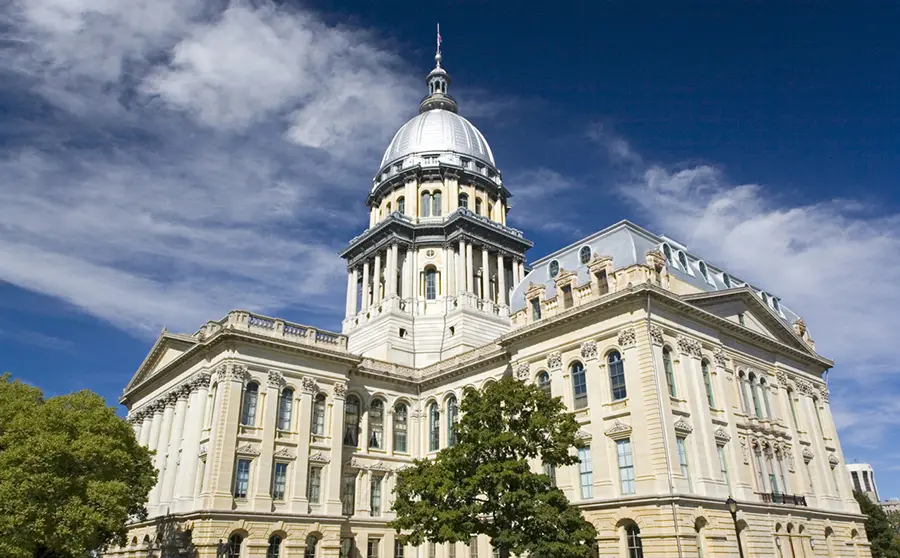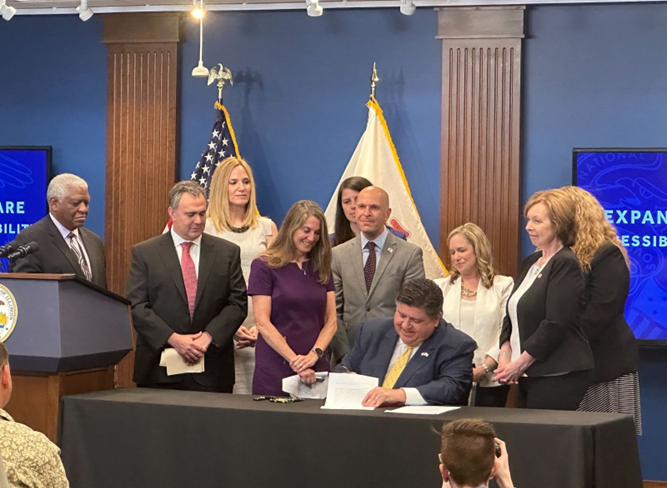
July 21, 2023
In our spring legislative agenda, the Shriver Center pushed state lawmakers to enact a host of progressive policies that would allow all individuals and families to thrive, regardless of income or identity.

With the help of our partners, this spring the General Assembly approved measures to step up protections for workers with low wages, increase pay equity, safeguard much-needed public assistance benefits, and expand access to affordable health care. We thank Illinois legislators for approving policies that advance racial and economic justice in the areas outlined below.
All workers deserve reasonable protections to manage personal and family affairs. Governor J.B. Pritzker signed SB 208, a paid leave law that allows most Illinois workers to take five days of paid time off over a 12-month period for any reason. Workers will begin to accrue paid leave on the first day of employment. This makes Illinois one of only three states to give workers paid time off that can be used for any reason.
Pay equity is essential to address systemic racism and gender biases. HB 3129 takes an important step toward curbing income inequality by requiring salary transparency. Starting in 2025, companies with 15 or more employees must provide salary ranges and a general description of benefits for all job postings. Disclosing pay ranges keeps employers accountable, levels the negotiating playing field, and gives applicants, employees, and enforcement agencies information to fix unfair income discrimination.
Systemic inequities and the legacy of structural racism in the United States make it harder for people living in poverty and people of color to achieve financial stability. Guaranteed income programs, like the ones in Cook County and the City of Chicago, give people with low income direct cash payments they can spend as needed. The passage of SB 1665 ensures guaranteed income recipients will not lose access to other public benefits because their payments will not be calculated as part of their income.
Everyone should be able to put food on the table, regardless of their financial situation. One in six Illinoisians rely on the Supplemental Nutrition Assistance Program (SNAP) to feed themselves and their families. As the nation has seen a rise in stolen SNAP benefits, the federal government has ordered states to repay benefits stolen on Oct 1, 2022, to September 30, 2024. With the passage of HB 2214, the Illinois Department of Human Services will be required to report to the General Assembly on the frequency of electronic theft of SNAP benefits, as well as provide information on the thefts to law enforcement.
Everyone deserves access to affordable, comprehensive health care, no matter their income, race, gender, or national origin. The governor recently signed into law two important measures that will improve the health of Illinoisians. The Shriver Center advocated for these bills for many years.
HB 2296 gives the Department of Insurance (DOI) the authority to deny insurance premium increases if they are unreasonably high. This new authority will help individuals and small businesses by making health coverage more affordable. The law also requires insurance companies to provide clear and transparent public information on proposed rate increases and requires DOI to publish an annual report explaining health care costs in easy-to-understand terms.
The other bill, HB 579, authorizes Illinois to create a state-based health care exchange by 2026 instead of using the federal HealthCare.gov marketplace. With its own health insurance marketplace, Illinois can more easily expand access to affordable health care and identify and enroll uninsured individuals. Additionally, the state exchange would safeguard Illinois from future federal efforts to limit health care subsidies or reduce enrollment and give Illinois the flexibility to tailor its marketplace to better meet the needs of its diverse population.
Our fight for a more equitable Illinois does not stop here. We continue to advocate for access to health care coverage, regardless of immigration status. We fought and won to get $550 million earmarked for immigrant health care programs , the largest amount to date. Currently, Illinois covers over 63,000 previously uninsured immigrants.
Our movement was dealt a setback, when the governor implemented emergency rules beginning July 1 that paused new enrollment of immigrants between the ages of 42 to 64 and capped enrollment of immigrant seniors to 16,500 individuals. To keep health care affordable and access to care meaningful, we oppose the measure allowing providers to charge high copays for emergency room visits, hospitalizations, and cost-sharing for critical outpatient medical services. We urge the governor to reverse these harmful policies and will continue to work in coalition until health coverage is expanded to 19 to 41-year-olds.
Families with low income need more support. We urge the General Assembly to approve the Paid Family and Medical Leave Act so that all workers, especially those in low-wage jobs, can take paid time off to care for themselves or their family members. Legislators also need to implement a state child tax credit (CTC) for lower-income families. The expanded federal CTC during COVID lifted 2.1 million children out of poverty in 2021. It should be made permanent. Combined, the two would dramatically reduce poverty in our state.
We can’t do this work without you. Here are ways to use your voice to help advance racial and economic justice in Illinois.
Our laws and policies must support people by ensuring fair work at a living wage and by providing the income supports families need to be successful.
America’s greatest strength is its diversity.
Systemic inequities and the legacy of structural racism make it harder for low-income people and people of color to achieve financial stability.
Everyone should be paid decently and have basic workplace protections.
Healthcare is a human right. The high cost of care means millions of families have no access to the critical care all human beings deserve.
We are intentional about addressing barriers to healthcare that specific communities experience.